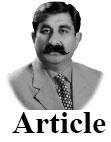Naveed Aman Khan
DURING the year 2015, faced with a deadlock and unable to hold a referendum on self-determination authorised by the Spanish State, the head of the Catalan Executive, Artur Mas, decided to call regional elections that would serve politically as a proxy “plebiscite”. The two main secessionist parties formed a coalition to take part in these elections, with a single issue on their electoral programme: yes to Catalan independence. The secessionist parties won the elections, having obtained a majority of seats in the regional parliament, but lost their “plebiscite”, winning only 47.8 per cent of the popular vote. After this setback, the Catalan regional government began working towards holding a unilateral referendum on independence. The Catalan Executive openly repudiated the idea of proposing a constitutional reform that would enable a referendum on self-determination to be held without flouting the Constitution, as they knew that the reform proposal would not win the majority required by the Spanish Constitution. In January 2016, the most radical and left wing secessionist party the Candidatura d’Unitat Popular (CUP) instigated the removal of Artur Mas from his position as head of the Catalan Executive because of his responsibility in the major cuts in government spending during the recession. Mas are replaced that same month with someone far more radical, willing to go to whatever lengths necessary to hold a unilateral referendum on independence. Under Puigdemont’s leadership, the Catalan government began surreptitiously working on a scheme for unilateral independence which, among other aspects, included active propaganda for the secessionist cause outside Spain’s borders and which the Catalan government itself termed the process for building “State structures”.
On 10 October 2017, Catalonia’s regional premier, Carles Puigdemont, attempted to drum up the support of international players in the hope of securing international mediation that would oblige the Spanish Government to negotiate Catalan independence. The Catalan parliament, spurred by the regional government, declared the independence of Catalonia on Friday, 27 October 2017. The Spanish Government, pursuant to Article 155 of the Constitution, was authorised by the Senate to adopt extraordinary measures enabling the Spanish Executive to assume direct rule over Catalonia, but without suspending the region’s autonomy. The following day, Puigdemont and a few of his closest collaborators headed surreptitiously for Belgium, travelling by both car and plane. A few days later, the competent Spanish courts issued arrest warrants for a number of individuals: primarily members of the Catalan government, the Speaker of the regional parliament, and the leaders of the two secessionist organisations that had been most active in organising and undertaking the illegal referendum. In November, the trial proceedings formally began, following a lengthy period of investigation.
The hearings began in February, and it can reasonably be expected that a judgment will be handed down sometime in autumn 2019. The secessionists have at all times categorised the politicians currently in detention as political prisoners. This is patently false. Spain is a democratic State under the rule of law. Amnesty International and Human Rights Watch have described these detainees as prisoners of conscience that is to say, people imprisoned solely for exercising their freedom of expression or political prisoners although their prolonged pre-trial detention has been criticised. All the individuals who currently stand accused in relation to the secessionist process have been charged for committing acts which prima facie have been considered by Spanish judges to constitute crimes that are defined in Spain’s Criminal Code (including rebellion, sedition, and misappropriation of public funds).
To see that freedom of expression is fully respected in Spain, we need look no further than the current leader of the Catalan executive, Quim Torra, who daily voices his longing for Catalonia’s independence, while simultaneously denigrating each and every institution of the Spanish State. Torra is free to travel abroad unrestricted, actively disseminating pro-independence propaganda, without any kind of governmental or judicial interference whatsoever. The Spanish Government assumed direct rule over Catalonia, regional elections were organised by the Spanish Government on 21 December 2017. These elections were again won by the secessionist bloc with 47.50 per cent of the votes, although the political party that individually received the largest number of votes was Ciudadanos, whose stance is openly anti independence (25.35 per cent of the votes. In the nationwide elections held on 28 April 2019, the three explicitly pro-independence parties obtained 39,38 per cent of the votes cast in Catalonia. The regional premier Torra declares that he is only standing in for the “legitimate” regional premier, Puigdemont. Catalan society is today deeply divided. Particularly worrying is the way in which the very regional President hails and spurs radical separatist groups, which on October 1, 2018 were close to storming the regional parliament. These groups occasionally incur in vandalism, such as the blocking of highways and railways as in December 2018, without a clear reaction of the regional police, following political guidelines. It is worth recalling that in the recent national and local elections held in April and May 2019, the share of pro-independence vote was 39.30 per cent and 38.80 per cent respectively. Several Catalonian malafide politicians are lying and misleading the innocent Spanish and expatriates against federation of Spain. Along with others misled expatriates very wrongly are playing negative and malafide role in Catalonia. So much so for petty benefits thousands of Pakistanis and other expatriates are also playing unjustified and unlawful role in favour of unconstitutional Catalonia. State within the State is never accepted. Constitution is always supreme. Under the umbrella of His Majesty the King Spanish central government will have to assert its writ within the territory of the country no matter who is who.
— The writer is book ambassador, columnist, political analyst and author of several books based in Islamabad.










